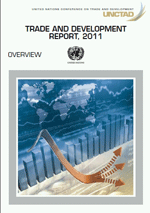Fiscal tightening, a suicidal policy
Published on Fri, 2011-10-07 08:22
An UNCTAD report warns against fiscal rigour as a suicidal policy, since it “weakens recovery, hampers improvement in public revenues and even reduces fiscal revenue by hindering economic growth. However, as Roberto Bissio argues in his column for Agenda Global, the fiscal rigour fashion is spreading not only among rich countries that are heavily indebted but now also among developing countries that do not have this problem. Austerity, an unnecessary punishment At a time when fiscal tightening is becoming the new fashion, the United Nations has warned that the austerity policies may cause social harm and may be economically the wrong answer to the crisis. At the outbreak of the financial crisis in September 2008, when large investment banks and stock markets collapsed, governments reacted by socializing the losses to avoid worse disasters and by stimulating their economies either with “automatic stabilizers” like unemployment benefits or with stimulus packages of increased public spending to make up for the lack of private demand in markets. Three years on, in the middle of September of this year, the world’s stock exchanges collapsed once more and big German, French and United States banks are again teetering on the brink of bankruptcy. But today the political prescription for these ills is just the opposite: instead of spending more, governments are cutting their expenditure. According to the Geneva-based United Nations Conference on Trade and Development (UNCTAD), rich countries and poor countries reacted in different ways to the 2008 crisis, “In the developing countries as a group, economic growth suffered less of a negative impact thanks to active counter-cyclical fiscal policies”, in other words they increased public spending when their economies contracted. The recently-published 2011 Report on Trade and Development concludes that, “As a consequence, fiscal results improved in 2010 and the ratio between debt and product was kept under control”. The developed countries took a different route; they geared their stimulus packages to re-establishing bank assets by converting private debt into public debt and they gave tax cuts to millionaires. This meant that levels of indebtedness increased to an average of 60% of the product in the developed countries and to more than 100% for most of the members of the G7. Thus, “governments are beginning to switch from fiscal stimulus to fiscal discipline in an effort to maintain or recover the confidence of financial markets in their solvency, which is seen as key to economic recovery”. Everyone knows that the 2008 crisis was caused by the failure of financial markets. However, after rescuing financial institutions that acted irresponsibly and were guided by erroneous estimates from risk evaluators, governments are now relying on the judgment of these same financial specialists as to what the best financial and macroeconomic policy should be, even if this means taking measures that hurt the public. According to UNCTAD “fiscal tightening is premature in many countries where private demand has not yet recovered and where stimulus is still needed to avoid stagnation”. And in fact, “premature fiscal tightening could be self-defeating if it weakens the recovery process, hampers improvement in public revenues and increases the fiscal costs related to the recession and bailouts. Hence, by hindering economic growth, such a policy would fail to achieve fiscal consolidation." But in spite of these warnings the fashion is spreading, not only among the rich heavily-indebted countries but also among developing countries that do not have this problem. The United Nations Fund for Children (UNICEF) has studied the social and fiscal policies in one hundred and twenty-eight DEVELOPING countries and concludes that while most governments protected their vulnerable populations, particularly children, from the impact of the crisis in 2008 and 2009, from 2010 on social spending started to contract prematurely. These are the countries that according to UNCTAD have weathered the crisis best. The conclusion is that although most of these governments protected their vulnerable populations, particularly children, from the impact of the crisis in 2008 and 2009, they began to prematurely cut social spending in 2010. More than ninety countries (seventy percent of respondents) have reduced their spending in 2012 and a fourth is on its way to an "excessive contraction," that is a cut social spending to levels lower than their pre- crisis. Even if the need to reduce the fiscal deficit was compelling in some of these countries, Ortiz argues that there is "an extensive menu of options" to achieve this result by other means, such as redistributing the budget and cutting defense spending increasing taxes on income, wealth or conspicuous consumption, reducing capital flight, using the reserves accumulated in central banks and even reviewing the macroeconomic doctrines to admit that a little fiscal deficit may be a good idea to avoid loss of human capital. *Coordinator of the Social Watch international secretariat Source: Agenda Global » |
SUSCRIBE TO OUR NEWSLETTER



